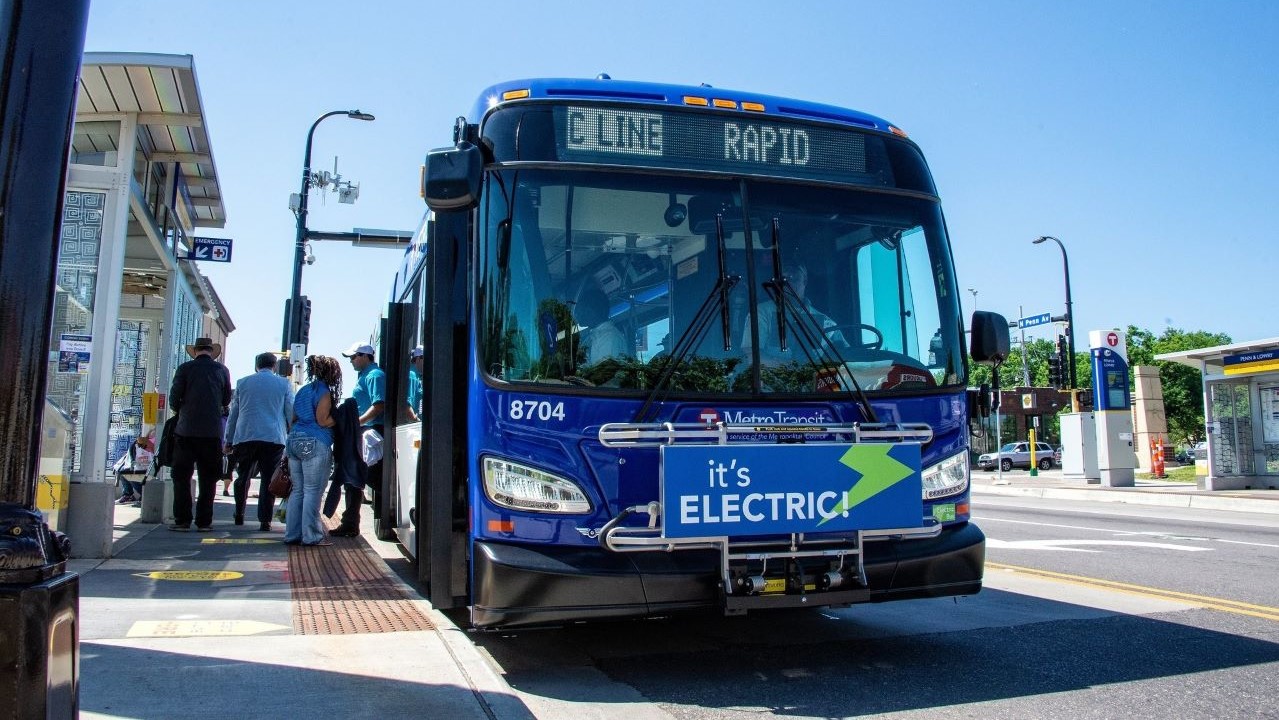
Metro Transit, the major transit agency serving the seven-county Twin Cities Metropolitan Area, has published its much-anticipated Zero Emission Bus Transition Plan. The Coalition for Clean Transportation, a team of local clean energy, environmental, and social justice advocacy groups that Fresh Energy is part of, supported this plan from its initial ideation to its final form. Alongside Coalition partners, Fresh Energy commends Metro Transit for taking an important step towards electrifying its bus fleet and modeling the transition to a clean, healthy transportation system.
“We are pleased and excited that Metro Transit is leading the Midwest in electrifying its buses,” said Anjali Bains, lead director of Energy Access and Equity at Fresh Energy. “Expanding and electrifying our transit system is key to addressing climate change, transportation pollution, and racial inequity, and we look forward to supporting Metro Transit in its progress.”
“Communities of color in Minnesota live in high traffic areas with more air pollution, which contributes to higher rates of chronic illness, including asthma. Deploying electric buses in these communities will reap the benefits of improved health for both children and adults,” noted Kathleen Schuler, policy director with Health Professionals for a Healthy Climate.
“The transition to zero emission vehicles is urgently needed to reduce the worst impacts of climate change and air pollution,” said Madi Johnson, a community organizer with MN350. “Metro Transit’s leadership in reducing fleet emissions will not just improve the lives of people across the metro, but will provide a blueprint for other cities across Minnesota to follow.”
“Metro Transit is plugging into the future—and the future is electric,” noted Joshua Houdek, senior program manager for the Sierra Club. “We commend Metro Transit for their roadmap to a clean, zero emission bus fleet that will serve residents across the Twin Cities region.”
Electric buses represent a solution to both climate and health issues. Transit buses like those owned by Metro Transit typically run on diesel, a fossil fuel that releases not only climate-damaging emissions like carbon dioxide but also health-harming pollutants like fine particulate matter and nitrogen oxides when combusted. When we breathe these emissions at elevated levels over long periods of time, these air pollutants cause significant negative health impacts such as asthma, heart disease, cancer, and premature death. Communities living along busy highways, a large proportion of which are Black, Indigenous, and People of Color (BIPOC) and/or under-resourced, bear the brunt of harm caused by transportation pollution. Reducing traffic and tailpipe emissions through electrifying transit is one way to alleviate this disproportionate pollution burden.
Metro Transit was directed by the Minnesota Legislature to create a bus electrification plan last spring. Alongside providing $250,000 in funding for this plan, the legislature also outlined what it should include, from setting transition milestones to analyzing best practices of other transit agencies making the shift to electric buses. The final Zero Emissions Bus Transition Plan sets a near-term goal of ensuring at least 20 percent of its 40-foot replacement bus purchases are electric for the next five years, starting in 2022. Further milestones will be developed based on data collected during this initial phase.
The plan also describes how Metro Transit will prioritize deployment of new electric buses along routes serving communities most impacted by air pollution, an element Coalition members in particular advocated for during plan development and are pleased to see included in the final plan.
The publication of a bus electrification plan comes at a crucial juncture in the shift to an electric transportation future. In October 2021, Congress passed the Bipartisan Infrastructure Law which included $7.5 billion for electric buses. Transit agencies must submit a bus electrification plan to apply for the competitive grant program, placing Metro Transit ahead of many of its peer agencies and in a strong position to leverage the competitive grant opportunity once the program opens later this spring or summer.
After a successful campaign to adopt clean car standards in Minnesota for passenger vehicles concluded last summer, the Coalition for Clean Transportation has shifted towards electrifying the biggest source of health-harming diesel emissions in Minnesota: medium and heavy-duty vehicles. In addition to organizing for electric buses, the Coalition has commissioned a report due out in early March to show the climate, health, and economic benefits of electrifying this sector. To learn more about this and other efforts, you can join Coalition member MN350 on March 10 at its “Bus Back Better” event!
Fresh Energy looks forward to continuing to engage with all partners, collaborators, and members of the public to ensure we expand and electrify our public transit in a way that will benefit everyone in Minnesota. Stay tuned for further updates!
